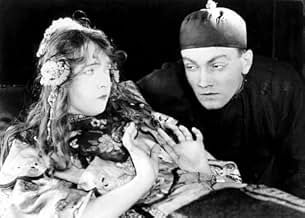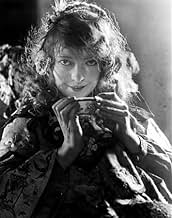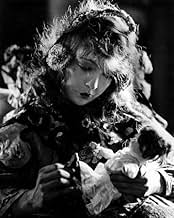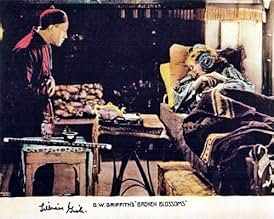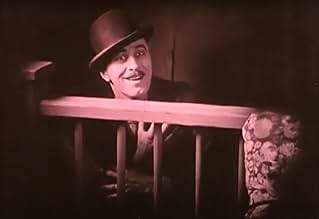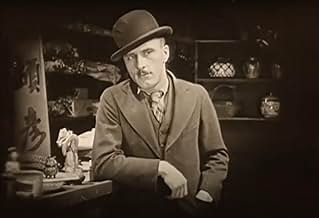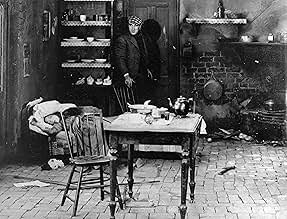NOTE IMDb
7,2/10
12 k
MA NOTE
Une frêle jeune femme martyrisée par son père, un boxeur violent, se lie d'amitié avec un immigré chinois qui va tenter de l'aider.Une frêle jeune femme martyrisée par son père, un boxeur violent, se lie d'amitié avec un immigré chinois qui va tenter de l'aider.Une frêle jeune femme martyrisée par son père, un boxeur violent, se lie d'amitié avec un immigré chinois qui va tenter de l'aider.
- Réalisation
- Scénario
- Casting principal
- Récompenses
- 1 victoire au total
Lillian Gish
- Lucy - The Girl
- (as Miss Lillian Gish)
Richard Barthelmess
- Cheng Huan - The Yellow Man
- (as Mr. Richard Barthelmess)
Edward Peil Sr.
- Evil Eye
- (as Edward Peil)
Ernest Butterworth
- Secondary Role
- (non crédité)
Frederic Hamen
- Secondary Role
- (non crédité)
Wilbur Higby
- London Policeman
- (non crédité)
Man-Ching Kwan
- Buddhist Monk
- (non crédité)
Bobbie Mack
- Ringside Employee
- (non crédité)
Moy Ming
- Minor Role
- (non crédité)
Steve Murphy
- Fight Spectator
- (non crédité)
George Nichols
- Police Constable
- (non crédité)
Karla Schramm
- Burrows' Girlfriend
- (non crédité)
Bessie Wong
- Girl in China
- (non crédité)
Avis à la une
D.W.Griffith returns for another one and it would appear that he was still fighting with the demons left over from A Birth of a Nation (1915). He again tried to deal with the fires of racism, but this time with a love story and another appearance by Lillian Gish, in Broken Blossoms (1919). This film's title is actually "Broken Blossoms or the Yellow Man and the Girl". "Yellow Man" refers to the Asian man, Cheng Huan, who falls in love with Gish's Lucy. Right off the bat we get exposed to old time racist terms. The "C" word makes an appearance too. But, Griffith does use this film as a tool to teach a lesson to those who are evil or just plain bad.
It covers a lot of domestic/controversial issues, such as, interracial relationships, child abuse, racism and bullying. It is a hope that this film was the first stepping stone to finding tolerance in the world. It also is a telling lesson about, no matter how civilized you are, you can still do a lot of wrong. Huan (Barthelmess), leaves his homeland to go to England to spread the wisdom of the Buddha to the West and the Anglo-Saxons. It is the biggest mistake he would make in his life. It is a telling story about how the good guy finishes last. The man who comes to the civilized world to try and help make those people better, finds out that he is in the wrong place at the wrong time and nothing but torment befalls him.
Huan assigns himself the job to look after a young woman (Gish), who is terrorized and beaten by her boxer father (Crisp), on a daily basis. Huan has to deal with snitches and liars who align themselves with the evil boxer and in the end finds himself falling into the same dark abyss that he tried to teach others to stay away from. This is an amazing story and has been told many times since, but being that this is a pioneering effort, makes it all the more powerful. True, there are parts that are slow and even boring, but it is that tense situation that starts to build and build until the terrifying and sad end.
8.1 (B MyGrade) = 8 IMDB
It covers a lot of domestic/controversial issues, such as, interracial relationships, child abuse, racism and bullying. It is a hope that this film was the first stepping stone to finding tolerance in the world. It also is a telling lesson about, no matter how civilized you are, you can still do a lot of wrong. Huan (Barthelmess), leaves his homeland to go to England to spread the wisdom of the Buddha to the West and the Anglo-Saxons. It is the biggest mistake he would make in his life. It is a telling story about how the good guy finishes last. The man who comes to the civilized world to try and help make those people better, finds out that he is in the wrong place at the wrong time and nothing but torment befalls him.
Huan assigns himself the job to look after a young woman (Gish), who is terrorized and beaten by her boxer father (Crisp), on a daily basis. Huan has to deal with snitches and liars who align themselves with the evil boxer and in the end finds himself falling into the same dark abyss that he tried to teach others to stay away from. This is an amazing story and has been told many times since, but being that this is a pioneering effort, makes it all the more powerful. True, there are parts that are slow and even boring, but it is that tense situation that starts to build and build until the terrifying and sad end.
8.1 (B MyGrade) = 8 IMDB
Many people believe the best Griffith film is "Intolerance"; some stand by "Way Down East" and still others believe in "Birth of a Nation" despite all its problems. However, I think "Broken Blossoms" is the Griffith film which stands the test of time and still rings true today, over 83 years from its debut.
"Broken Blossoms" is the story of two wounded, abused, seemingly hopeless individuals who find comfort and strength in one another. The Chinaman (played by Richard Barthelmess) and little Lucy Burrows (played by Lillian Gish) are as different as night is to day, however they complement each other and give each other what the other needs; Lucy gives the Chinaman respect as a human being, he in turn gives Lucy affection and love.
What happens to the two souls is, in my opinion, one of the most heartbreaking turn of events ever filmed. The brutal treatment of Lucy by her father and the ultimate sadness of the Chinaman at the end of the film always reduce me to tears.
Those who believe that silent movies are inferior to today's craft really needs to see "Broken Blossoms" and open their hearts and minds to a world that is beyond beauty and beyond pain.
"Broken Blossoms" is the story of two wounded, abused, seemingly hopeless individuals who find comfort and strength in one another. The Chinaman (played by Richard Barthelmess) and little Lucy Burrows (played by Lillian Gish) are as different as night is to day, however they complement each other and give each other what the other needs; Lucy gives the Chinaman respect as a human being, he in turn gives Lucy affection and love.
What happens to the two souls is, in my opinion, one of the most heartbreaking turn of events ever filmed. The brutal treatment of Lucy by her father and the ultimate sadness of the Chinaman at the end of the film always reduce me to tears.
Those who believe that silent movies are inferior to today's craft really needs to see "Broken Blossoms" and open their hearts and minds to a world that is beyond beauty and beyond pain.
The subjects this film deals with are ugly, but the whole thing is done in a beautiful way.
Subjects dealt with are racism, poverty and the reasons why.
The way Griffith deals with these subjects is the contrasts settings. Look at the room above the Chinaman's shop: opulent, festooned with the finest oriental silk. Compare that with the stark squalor of the abode of Lucy and her bruiser of a father. Then there is the education and sophistication of the orientals compared to the simplistic, ill-thought-out racial prejudice of Battling and his cronies.
I also enjoyed the boxing match. Very realistic - not the fantastic nonsense of your Rocky-type bout where a man all but beaten to a jelly suddenly pulls some heavy punches from nowhere and wins the fight.
The acting, as has been mentioned elsewhere, is terrific from all three of the principal characters. Also, their characters are well-drawn. Even Battling Burrows - complete with cauliflower ear - is more than a mere heavy: he boxes for a living, he drinks, he lives in a slum with few worldly possessions. Why?
I find it hard to believe that the films they make nowadays are nowhere near as good as this. Whatever happened to progress?
This film spawned the famous song "Limehouse Blues."
Subjects dealt with are racism, poverty and the reasons why.
The way Griffith deals with these subjects is the contrasts settings. Look at the room above the Chinaman's shop: opulent, festooned with the finest oriental silk. Compare that with the stark squalor of the abode of Lucy and her bruiser of a father. Then there is the education and sophistication of the orientals compared to the simplistic, ill-thought-out racial prejudice of Battling and his cronies.
I also enjoyed the boxing match. Very realistic - not the fantastic nonsense of your Rocky-type bout where a man all but beaten to a jelly suddenly pulls some heavy punches from nowhere and wins the fight.
The acting, as has been mentioned elsewhere, is terrific from all three of the principal characters. Also, their characters are well-drawn. Even Battling Burrows - complete with cauliflower ear - is more than a mere heavy: he boxes for a living, he drinks, he lives in a slum with few worldly possessions. Why?
I find it hard to believe that the films they make nowadays are nowhere near as good as this. Whatever happened to progress?
This film spawned the famous song "Limehouse Blues."
This has been one of my all-time favourite films since I taped it off UK Channel 4 1st October 1988 on its second showing, one to savour and revel in every few years. There really is no choice: the only version worth seeing is this one, the Brownlow & Gill UK remaster with Louis F. Gottchalk's themes lushly orchestrated by David Cullen and Carl Davis and the Thames Silents Orchestra. From a good silent film Broken Blossoms is beautifully transformed into a work of Art, the merger of the music and Billy Bitzer's visuals can be so striking. And the intelligent tinting was gorgeous too. Over the years I've even played it just for the music sometimes!
The story? Depressed Chinese ex-missionary in London falls under the spell of listless poverty-stricken beautiful white 15 yo daughter of violent boxer. The crafty and base whites think the worst, but we know that the yellow man's love remained pure - even his worst foe says this ... I know that most people today would hoot at the acting abilities displayed: Lillian Gish's pathetic submissiveness, Donald Crisp's over the top savage expressions and Richard Barthelmess's determinedly serious inscrutability, but appreciation of silent melodramas as a genre is really required rather than simply selecting just one film to watch, such as this. And then again some people have to get over a white man playing a Chinese man whilst simultaneously approving of miscegenation in these much more enlightened times! Would these same people be bothered if a Chinese played a white man? Along with Birth of a Nation and Intolerance, this was Griffiths' best work, pinnacles of the cinema.
Utterly spellbinding poetic stuff for the enlightened, dreadful if your favourites are cgi-riddled and no older than 6 months. And don't expect a remotely happy ending! The beauty that all the world missed smote him to the heart (paraphrase).
The story? Depressed Chinese ex-missionary in London falls under the spell of listless poverty-stricken beautiful white 15 yo daughter of violent boxer. The crafty and base whites think the worst, but we know that the yellow man's love remained pure - even his worst foe says this ... I know that most people today would hoot at the acting abilities displayed: Lillian Gish's pathetic submissiveness, Donald Crisp's over the top savage expressions and Richard Barthelmess's determinedly serious inscrutability, but appreciation of silent melodramas as a genre is really required rather than simply selecting just one film to watch, such as this. And then again some people have to get over a white man playing a Chinese man whilst simultaneously approving of miscegenation in these much more enlightened times! Would these same people be bothered if a Chinese played a white man? Along with Birth of a Nation and Intolerance, this was Griffiths' best work, pinnacles of the cinema.
Utterly spellbinding poetic stuff for the enlightened, dreadful if your favourites are cgi-riddled and no older than 6 months. And don't expect a remotely happy ending! The beauty that all the world missed smote him to the heart (paraphrase).
With some excellent acting performances and an interesting, memorable story, "Broken Blossoms" is one of the better pictures of the late 1910s, and it has held up rather well despite a couple of obvious signs of age. It would be hard to top Lillian Gish's performance as Lucy in any era, and Richard Barthelmess turns in a purposefully restrained and surprisingly effective performance in a role that was far from easy.
The story ties together several weighty themes, and most of them are still pertinent. This is the kind of movie that is sometimes considered to be dated, yet in terms of the main conflicts and struggles that the characters face, there are probably fewer differences between 1919 and 2004 than many might wish there to be. With material like this, it is also easy to allow it to become labored or heavy-handed. As it is, the tone is somber and austere throughout, yet most of the time this is in a thoughtful way.
Since Griffith's work is still so well-known and meets with such widely varying responses, it can sometimes be hard to evaluate his movies individually, without reference to the rest of his filmography. The story here is unusual enough in itself, with the different races and religions of the characters and the implied images represented by each of them. Each character is rather quickly defined as good or bad - a common state of affairs in Griffith movies - and as a result the story is told in a way that reflects that presumption, for better or for worse.
What is hard to deny is that the story and characters will stick with you afterwards. The impression that it leaves is not an entirely happy one, but the movie successfully evokes the humanity of all involved, which is a not unworthy goal and a not insignificant achievement.
The story ties together several weighty themes, and most of them are still pertinent. This is the kind of movie that is sometimes considered to be dated, yet in terms of the main conflicts and struggles that the characters face, there are probably fewer differences between 1919 and 2004 than many might wish there to be. With material like this, it is also easy to allow it to become labored or heavy-handed. As it is, the tone is somber and austere throughout, yet most of the time this is in a thoughtful way.
Since Griffith's work is still so well-known and meets with such widely varying responses, it can sometimes be hard to evaluate his movies individually, without reference to the rest of his filmography. The story here is unusual enough in itself, with the different races and religions of the characters and the implied images represented by each of them. Each character is rather quickly defined as good or bad - a common state of affairs in Griffith movies - and as a result the story is told in a way that reflects that presumption, for better or for worse.
What is hard to deny is that the story and characters will stick with you afterwards. The impression that it leaves is not an entirely happy one, but the movie successfully evokes the humanity of all involved, which is a not unworthy goal and a not insignificant achievement.
Le saviez-vous
- AnecdotesThe film was produced by D.W. Griffith for Adolph Zukor's Artcraft company, a subsidiary of Paramount Pictures. However, when Griffith delivered the final print of the film to Zukor, the producer was outraged. "How dare you deliver such a terrible film to me!" Zukor raged. "Everybody in the picture dies!" Infuriated, Griffith left Zukor's office and returned the next day with $250,000 in cash, which he threw on Zukor's desk. "Here," Griffith shouted, "If you don't want the picture, I'll buy it back from you." Zukor accepted the offer, thus making this the first film released by United Artists, the production company formed in 1919 by Mary Pickford, Charles Chaplin, Douglas Fairbanks, and Griffith. It was a remarkably successful film, both critically and at the box office.
- GaffesThe intertitles state, "The Buddha says, 'What thou dost not want others to do thee, do thou not to others.'" It was actually not the Buddha but Confucius' teaching.
- Citations
Lucy Burrows: Don't do it, Daddy! You'll hit me once too often - and then they'll - they'll hang yer!
- ConnexionsFeatured in The Philco Television Playhouse: The Birth of the Movies (1951)
Meilleurs choix
Connectez-vous pour évaluer et suivre la liste de favoris afin de recevoir des recommandations personnalisées
- How long is Broken Blossoms?Alimenté par Alexa
Détails
- Date de sortie
- Pays d’origine
- Langue
- Aussi connu sous le nom de
- Broken Blossoms
- Lieux de tournage
- Société de production
- Voir plus de crédits d'entreprise sur IMDbPro
Box-office
- Budget
- 88 000 $US (estimé)
- Durée
- 1h 30min(90 min)
- Mixage
- Rapport de forme
- 1.33 : 1
Contribuer à cette page
Suggérer une modification ou ajouter du contenu manquant

